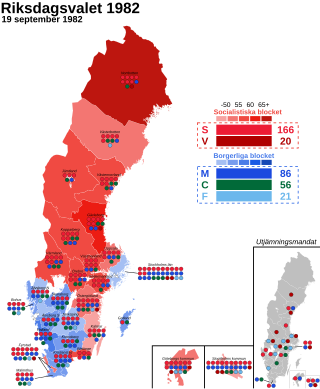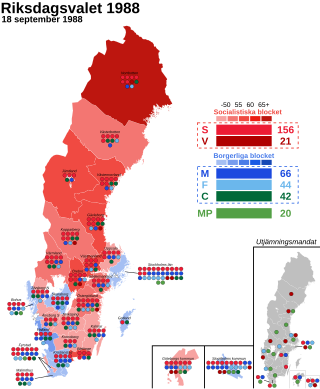
General elections were held in Sweden on 15 September 2002, alongside municipal and county council elections. The Swedish Social Democratic Party remained the largest party in the Riksdag, winning 144 of the 349 seats.

General elections were held in Sweden on 20 September 1998. The Swedish Social Democratic Party remained the largest party in the Riksdag, winning 131 of the 349 seats.

General elections were held in Sweden on 17 September 2006, to elect members to the Riksdag, the Swedish national legislature. All 349 seats were up for election: 310 fixed seats in 29 constituencies and 39 adjustment seats, used to ensure that parties have representation in the Riksdag proportional to their share of the national vote. The electoral system used was semi-open list proportional representation using the Sainte-Laguë method of allocating seats. Elections for County and Municipal councils were also held on the same day.

General elections were held in Sweden on 16 September 1973. The Social Democrats remained the largest party, winning 156 of the 350 seats.

General elections were held in Sweden on 16 September 1979. Although the Swedish Social Democratic Party remained the largest party, winning 154 of the 349 seats in the Riksdag, the liberal interim government of Ola Ullsten was succeeded by another centre-right coalition government composed of the People's Party, the Moderate Party and the Centre Party, led by Centre Party leader Thorbjörn Fälldin. The three parties together won 175 seats, compared to the 174 won by the Social Democrats and Communists. It was the only time that non-socialist parties retained power in an election between 1928 and 2010. The Moderates dramatically increased their representation in the Riksdag, becoming the largest party of the non-socialist bloc, a position they maintained until 2022.

General elections were held in Sweden on 19 September 1982. They saw the return of the Swedish Social Democratic Party to power after six years in opposition, the longest period in opposition by the Social Democrats since the 1910s. The center-right coalition of Thorbjörn Fälldin had earlier suffered a loss upon the breakup of the government in 1981, the year before the election, when the rightist Moderate Party chose to withdraw from the government, protesting against the centrist tax policies of the Fälldin government. After regaining power, Social Democratic leader Olof Palme succeeded in being elected Prime Minister again, having earlier held power between 1969 and 1976.

General elections were held in Sweden on 15 September 1985. The Swedish Social Democratic Party remained the largest party in the Riksdag, winning 159 of the 349 seats. Its leader, Olof Palme, kept his position as prime minister. He would retain this position successfully until his assassination in 1986.

General elections were held in Sweden on 18 September 1988. The Swedish Social Democratic Party remained the largest party in the Riksdag, winning 156 of the 349 seats.

General elections were held in Sweden on 15 September 1991. The Swedish Social Democratic Party remained the largest party in the Riksdag, winning 138 of the 349 seats. However, it was the party's worst showing since 1928 with 37.7% of the vote.

General elections were held in Sweden on 18 September 1994. The Swedish Social Democratic Party remained the largest party in the Riksdag, winning 161 of the 349 seats. Led by Ingvar Carlsson, the party returned to power and formed a minority government after the election. This was the final time the Social Democrats recorded above 40% of the vote before the party's vote share steeply declined four years later and never recovered. The Greens also returned to the Riksdag in the 1994 elections, after a three-year absence.
Sweden held a general election on the 16 September 1973. Results are published by the Statistical Central Bureau.
General elections were held in Sweden on 19 September 1976. Results were published by the Statistical Central Bureau.
General elections were held in Sweden on 16 September 1979. The centre-right alliance won the election with a margin of 8,404 votes.
Sweden held a general election on 19 September 1982, resulting in a change of government as the Social Democrats and Olof Palme returned to government after six years in opposition. 45.6% of the vote marked the party's strongest showing since winning more than half the vote in 1968. The Moderates became larger than the Centre Party and the People's Party combined. Having already been larger than both in 1979, the Moderates firmly established itself as the dominant force on the centre-right opposition as both of their former coalition partners suffered sizeable losses in seats.
Sweden held a general election on the 15 September 1985.
Sweden held a general election on the 18 September 1988.
Sweden held a general election on the 15 September 1991.
Sweden held a general election on 18 September 1994. As of the 2022 election, this was the final time in which the Social Democrats won more than 45% of the overall vote, marking a steady decline thereafter. The Green Party replaced the New Democracy party in the Riksdag, with the seven elected parties being represented in parliament into the 2020s after the Christian Democrats narrowly beat the parliamentary 4% threshold by a mere 3,752 votes.
Sweden held a general election on 20 September 1998. Although the Social Democrats hung onto being the largest party and being the largest parliamentary bloc, the party had its worst election result in the unicameral Riksdag era at 36.4%. Both the Left Party and the Christian Democrats had record high results instead, while the Centre Party and People's Party had record low vote shares.
Sweden held a general election on 15 September 2002.





















